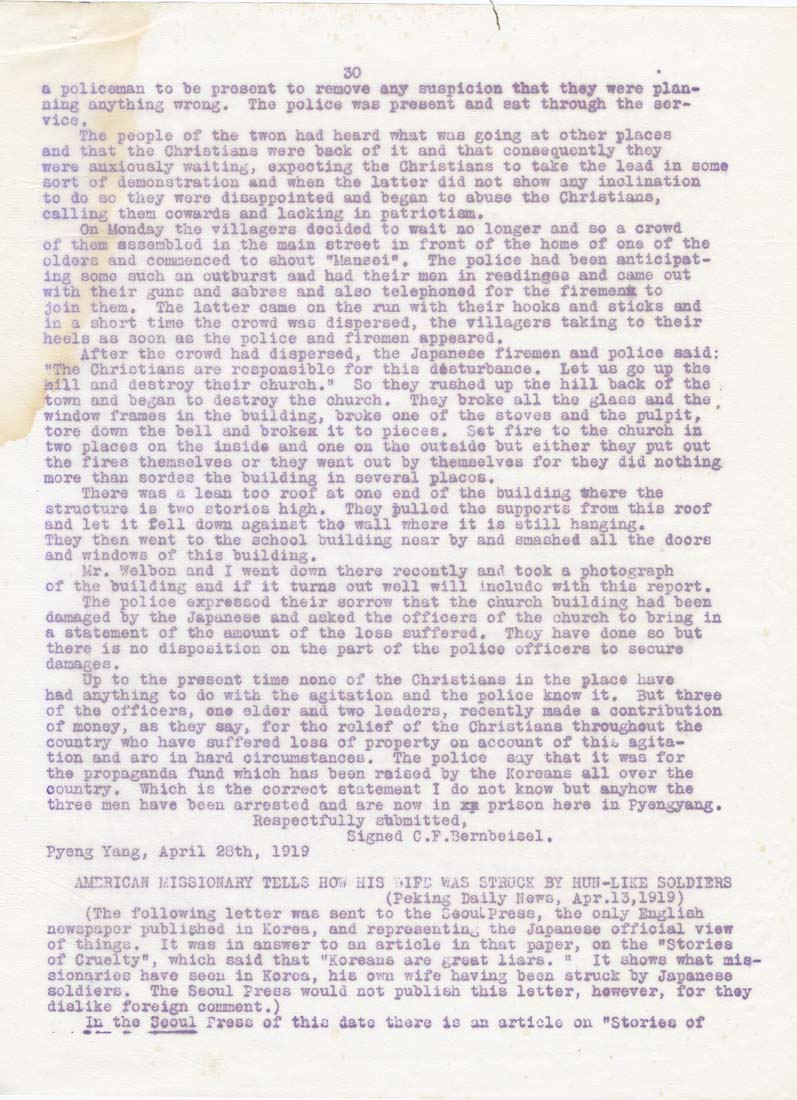V
30
a policeman to be present to remove any suspicion that they were plan¬
ning anything wrong. Tho police was present and aat through the ser¬
vice.
The people of the twon had heard what was going at other places
and that the Christians were back of It and that consequently they
were anxiously waiting, expecting the Christians to take the lead In some
sort of demonstration and when the latter did not show any Inclination
to do so they were disappointed and began to abuse tho Christians,
calling them cowards and lacking in patrlotlsa.
On Monday the villagers decided to wait ao longer and so a crowd
of them assembled in the main street in front of the home of one of the
ciders and commenced to shout "llaneoi". The police had been anticipat¬
ing sorao such an outburst aad had their men in readlngsa and came out
v/ith their sanz and sabres and also telephoned for the firemen* to
join them. The latter came on the run with their hooka and sticks and
in a short time the crowd was dispersed, the villagers taking to their
heels as soon as the police and firemen appeared.
After the crowd had dispersed, the Japanese firemen aad police aald:
"The Christians are rcspoasiblo for this dtsturbance. Let us go up the
kill and destroy their church." So they rushed up the hill back of the
town and began to destroy the church. They broke all the glass and the,
window frames in the building, broke one of the stoves and the pulpit,
tore down the bell and brokeai It to pieces. Set fire to the church in
two places on the inside and one oa the outside but either they put out
the fires themselves or they went out by themselves for they did nothing
more than sordes the building in several places.
There was a lean too roof at one end of ths building Where the
structure Is tvro stories high. They pulled the supports from this roof
and let It fell down against tho wall where it Is still hanging.
Thoy then went to the school building near by and smashed all the doors
and windows of this building,
Mr. Welbon and I went down there recently and took a photograph
of the building aad If It turns out well will include with this report.
The police expressed their sorrow that the church building had been
damaged by the Japanese and asked the officers of the church to bring in
a statement of tho amount of the loss suffered. They have done so but
there is no disposition on the part of the police officers to secure
damages.
Up to the present time none of the Christians in the place have
had anything to do with the agitation and the police know it. But three
of the officers, one elder and two leaders, recently made a contribution
cf money, as thoy say, for tho rollef of the Christians throughout the
country who have suffered loss of property on account of this, agita¬
tion and arc in hard circumstances. The police say that it was for
the propaganda fond which has been raised by the Koreans all over the
country. Which Is the correct statement I do not know but anyhow the
three men have been arrested and are now in z? prison here In Pyengyang.
Respectfully sbbmltted,
Signed CF.TJernbeisel.
Pyeng Yang, April 20th, 1919
ilMERICAN laSSIOKAHY TELLS HOV/ HIS v-IFr. V;AS STi^uCE BY HUIT-LKE S0LDI3RS
(Peking Daily Hews, Apr,13,1919)
(The following letter was sent to the SaouLpreas, the only English
newspaper published in Korea, and representing^ the Japanese official view
of things. It was in answer to an article in that paper, on the "Stories
of Cruelty", which said that "Koreans are great liars. " It shows what mis¬
sionaries have seen in Koroa, his omi wife having been struck by Japanese
soldiers. The Seoul Press would not publish this letter, however, for they
dislike foreign comment.)
In the Seoul Press of this date there Is an article on "Stories of
|








